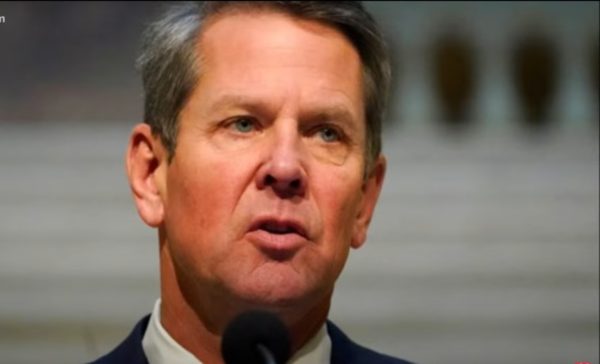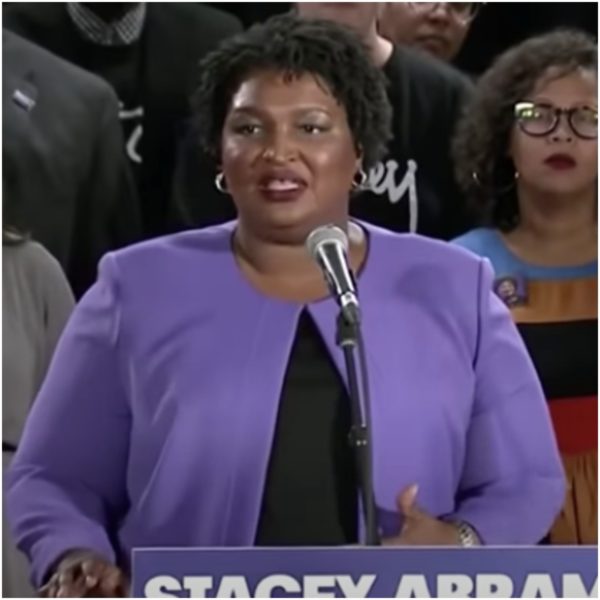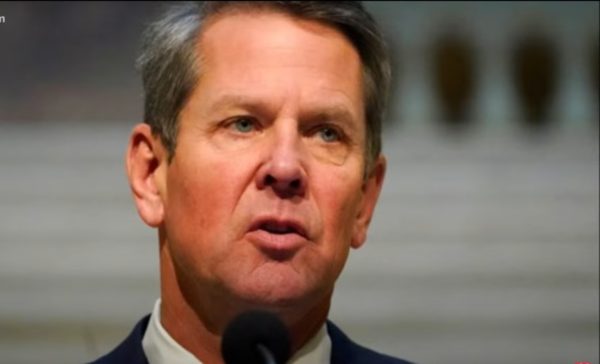Gov. Kemp Accuses Stacey Abrams of Causing ‘Fake Outrage’ That Led to MLB Yanking Its All-Star Game from Atlanta, Resulting In $100 Million Loss
Georgia Gov. Brian Kemp accused former Georgia gubernatorial candidate Stacey Abrams and President Joe Biden of mischaracterizing the state’s controversial new voting laws. Speaking at a news conference on Saturday, the Republican governor’s accusations came in the aftermath of Major League Baseball’s decision to pull its 2021 All-Star Game out of suburban Atlanta, and as more corporations speak out against the sweeping elections bill that was signed into law last month.
“The Election Integrity Act expands access to the polls and ensures the integrity of the ballot box. Then, why did MLB move the All-Star game yesterday? Because Joe Biden and Stacey Abrams have spent days lying to Georgians and the American people,” Kemp said at the Georgia State Capitol on April 3.

Baseball commissioner Robert Manfred announced on Friday that the All-Star Game would be relocated out of Atlanta because of the restrictive new law. A tourism official told CNN the decision to move the game out of the city will cost Atlanta about $100 million in lost tourism commerce.
“Georgians — and all Americans — should fully understand what the MLB’s knee-jerk decision means: cancel culture and woke political activists are coming for every aspect of your life, sports included. If the left doesn’t agree with you, facts and the truth do not matter,” Kemp said.
Kemp, who contends that the law will make elections safer, continued, “I will not back down. Georgians will not be bullied. We will continue to stand up for secure, accessible, fair elections.” He said he spoke to officials with the Atlanta Braves, who said they do not support the MLB’s decision to relocate the All-Star Game.
Kemp specifically accused Biden of not having read SB 202 and suggested that Abrams was profiting from the uproar the legislation has caused.
“The truth is that Joe Biden hasn’t read the bill and Stacey Abrams is raising millions off the fake outrage that she has created,” he said.
The controversial legislation, which has been likened to Jim Crow-era laws by Biden, imposes voter identification restrictions for absentee ballots, including the requirement of an ID to vote absentee by mail, limits both the amount of time voters have to request an absentee ballot and where ballot drop boxes can be placed, and makes it illegal to approach voters in line within 150 feet of the polling place and provide them with food or water.
New limits on the number of drop boxes stipulate each county must have at least one drop box but may have no more than one drop box for every early polling site or one per 100,000 active voters, whichever number is lower. Urban Fulton County, whose county seat is Atlanta, could be left with five drop boxes or fewer for its 1 million residents under the new law, which also limits times the boxes may be accessed.
The New Georgia Project, a group founded by Abrams after her narrow loss to Kemp in the 2018 race for governor, has filed a lawsuit against the state of Georgia over the law, claiming it violates the Voting Rights Act.
In an interview with The Atlanta Journal-Constitution, Abrams criticized the responses to the bill offered by corporations.
“The companies that stood silently by or gave mealy-mouthed responses during the debate were wrong,” Abrams said. “What people want to know now is where they stand on this fundamental issue of voting rights.”

Activists have pressured Georgia-based companies to condemn the elections law since before the bill was signed and are now calling for people to boycott the businesses.
Last week, Sen. Raphael Warnock refused to condemn calls to boycott companies that hadn’t spoken out agonist the law. “I think we need to use out voices,” said Warnock, who this year became the first African-American elected to the U.S. Senate from Georgia.
Major Georgia-based companies, including Coca-Cola, Delta Air Lines, and Home Depot, have spoken out against the restrictive legislation.
“The Georgia law is “unacceptable” and “a step backwards,” Coca-Cola CEO James Quincey told CNBC on March 31. “[It] is wrong and needs to be remedied, and we will continue to advocate for it both in private and now even more clearly in public.”
After facing backlash for not speaking out, Delta released a statement on the same day as the Coca-Cola CEO’s remarks, with Delta saying: “[I]t’s evident that the bill includes provisions that will make it harder for many underrepresented voters, particularly Black voters, to exercise their constitutional right to elect their representatives. That is wrong.”
GOP-led legislatures are seeking to pass similarly restrictive bills in other states. There are currently 361 bills in 47 states that would introduce provisions that would restrict voting access.
In Texas, American Airlines and Dell have spoken out against a proposed election law in the state.
American Airlines said in a statement, “To make American’s stance clear: We are strongly opposed to this bill and others like it. As a Texas-based business, we must stand up for the rights of our team members and customers who call Texas home, and honor the sacrifices made by generations of Americans to protect and expand the right to vote.”

